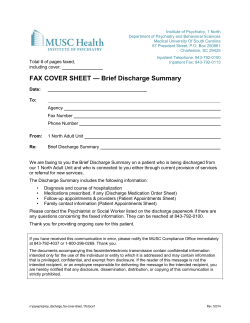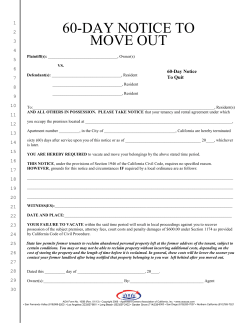
R Q S C RQSC representation at UW:
RQSC R e s i d e n t Q u a l i t y a n d S a f e t y C o m m i t t e e What is the RQSC? Volume 1, Issue 1 3.13.2014 The UW Resident Quality and Safety Committee (RQSC) is responsible for promoting resident participation in multi-disciplinary quality improvement, patient safety, resident education, and research. RQSC representation at UW: Quality Council Root Cause Analysis Epic Superuser Group IMOC Committee The group meets every other month and consists of residents from each core residency program as well as fellow representatives. Inside this issue: What is RQSC 1 Primary Care Redesign UW Safety Committee 1 Ambulatory Care Improvement Project Discharge 2 Heathcare Event Evaluation Team Discharge Collaborative Sepsis Project Collaborative CLER Visit 2 UW Resident QI 2 Symposium Culture of Safety 3 Survey RQSC members participate on many institutional quality and safety committees as well as QI projects (see right). Members also participate in a variety of institutional and departmental quality improvement projects. By Sarah Tevis (stevis@uwhealth.org) RQSC Members 3 Mark your calendar: UW Health Safety Committee Kick Off Collaborative The UW Health Safety Committee will kick off in spring 2014! The purpose of the committee is to participate in the review and/or evaluation of the services of UWMF and UWHC in order to help improve the quality and safety of health care services. Goals and responsibilities are outlined in the draft committee charter pending committee approval. Two examples include: 1) Provide the safest possible care in inpatient and ambulatory settings through a safety program utilizing both error prevention and error recovery strategies. 2) Communicate widely the lessons we By Linda Buel (lbuel@uwhealth.org) 4.17.14 UW Resident QI Symposium learn as a result of casual analysis of safety events. Two residents will join inpatient and ambulatory leadership and multi-specialty clinicians in composing the committee. 3.31.14 Launch Discharge Spring 2014 UW Safety Committee Launch June 2014 next RQSC Newsletter Page 2 Resident Quality and Safety Committee Discharge Collaborative Rolls out March 31st! The Discharge Collaborative is a multi-disciplinary committee, which has been working to develop a process for improving the discharge process at UW Health. Changes to the discharge process will roll out on March 31st. The collaborative was formed due to poor patient satisfaction with the discharge process hospital wide. Patient satisfaction rates have consistently hovered around 50%, while the goal satisfaction rate is >85%. Patients and caregivers are dissatisfied with delays in discharge, inadequate communication surrounding discharge, and Stay tuned for results from the 2013 Culture of Safety Survey Goals of the collaborative include improving patient satisfaction by facilitating more timely discharges and allowing for more coordinated discharge teaching. Important definitions include: Anticipated Discharge Date: Target for patient’s length of stay. To be discussed with the patient daily and entered as an order within 48 hours of admission (if known). Confirmed Discharge Date and Time: Date and time of discharge negotiated with the care team and patient. To be entered as an order as soon as the discharge date is known, ideally the day prior to discharge. This process has been piloted on D6/5 with encouraging results. The average time from confirmed discharge time and actual discharge was 28 minutes and patient satisfaction with the discharge process improved. We realize this is an iterative process and welcome any feedback as the new process rolls out March 31st. Please direct any questions, concerns, or comments to ndomask@uwhealth.org. By: Robert Hoffman MD (rjh@medicine.wisc.edu) Clinical Learning Environment Review Visit UW Hospital had a Clinical Learning Environment Review (CLER) site visit on December 3-5, 2013. The site visit focused on 6 core areas including patient safety, healthcare quality, supervision, transitions in care, duty hours/fatigue management and mitigation, and professionalism. “All residents unclear target dates for discharge. Overall the review committee was impressed with the resident’s learning environment and infrastructure in place for quality improvement and safety work. A few areas they highlighted for improvement included physician reporting of patient safety events, improving hand-off communication, and engaging residents in institutional quality and safety initiatives. Physicians account for <2% of PSNs filed and many residents reported that they were unlikely to report near misses. Future efforts will focus on: PSN submissions, hand off standardization, and increasing resident involvement with quality improvement and safety at UW. The RQSC will continue to serve as an advocate and liaison for resident involvement. By: Ashley Huth (ahuth@uwhealth.org) interested in quality improvement and patient safety are invited to join the RQSC.” - Sarah Tevis http://www.surgery.wisc.edu/resident-quality-improvement-symposium Please register for this event and submit a poster for QI projects in any phase of development/implementation. Cash prizes will be awarded for best posters! By Anne-Lise Maag (amaag@uwhealth.org) Resident Quality and Safety Committee Page 3 Culture of Safety Survey 2013 Medical Office/Clinic and Inpatient Culture of Safety surveys for all of UW Health were conducted at the end of 2013. The survey asks for employees’ opinions on patient safety issues, medical error, and event reporting. The survey identifies strengths and areas for patient safety culture improvement, compares with past survey results and utilizes the AHRQ national database to conduct external comparisons (>1,000 participating hospitals). We use the Agency for Healthcare Research and Quality (AHRQ) survey assessment tools, which was developed in 2004. Eighty two inpatient surveys and seventeen medical office surveys were completed by UW Health residents which included com- RQSC Committee Members ments specific to improvement recommendations. The residents’ survey results will be discussed at an upcoming Resident Quality and Safety Council. Look for a summary of results in an upcoming RQSC newsletter. By: Linda Buel (lbuel@uwhealth.org) Clean hands, save lives! Don’t forget hand hygiene! “Register for the UW Resident Quality Improvement Symposium!” - Anne-Lise Maag Any questions or comments regarding RQSC or this newsletter may be directed to Sarah Tevis (stevis@uwhealth.org).
© Copyright 2025





















